Revisionfor形容词和副
- 格式:doc
- 大小:46.50 KB
- 文档页数:2
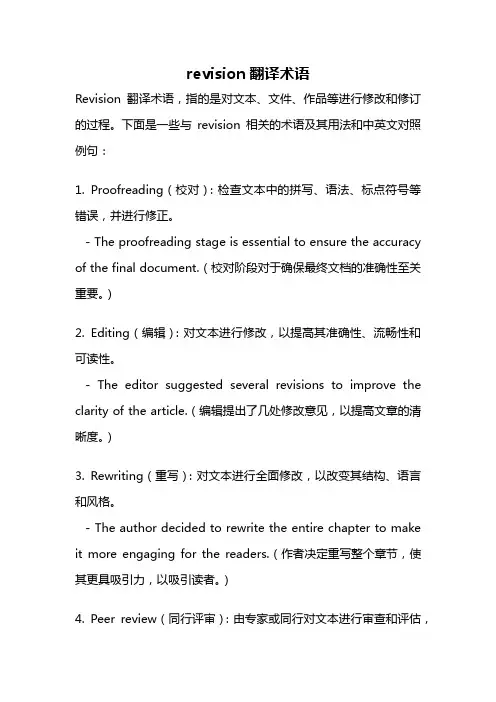
revision翻译术语Revision翻译术语,指的是对文本、文件、作品等进行修改和修订的过程。
下面是一些与revision相关的术语及其用法和中英文对照例句:1. Proofreading(校对):检查文本中的拼写、语法、标点符号等错误,并进行修正。
- The proofreading stage is essential to ensure the accuracy of the final document.(校对阶段对于确保最终文档的准确性至关重要。
)2. Editing(编辑):对文本进行修改,以提高其准确性、流畅性和可读性。
- The editor suggested several revisions to improve the clarity of the article.(编辑提出了几处修改意见,以提高文章的清晰度。
)3. Rewriting(重写):对文本进行全面修改,以改变其结构、语言和风格。
- The author decided to rewrite the entire chapter to make it more engaging for the readers.(作者决定重写整个章节,使其更具吸引力,以吸引读者。
)4. Peer review(同行评审):由专家或同行对文本进行审查和评估,以确保其质量和准确性。
- The research paper went through a rigorous peer review process before being published.(这篇研究论文在发表之前经过了严格的同行评审过程。
)5. Track changes(显示修改):在文档中显示修改和修订,以便作者和编辑进行查看和审阅。
- The track changes feature in Microsoft Word allows multiple users to collaborate on a document and see all the revisions made.(Microsoft Word的“显示修订”功能允许多个用户共同编辑一个文档,并查看所有的修改。
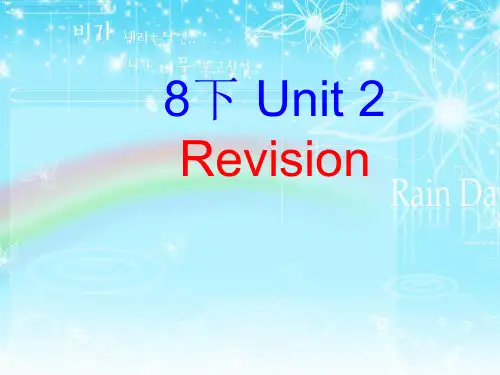

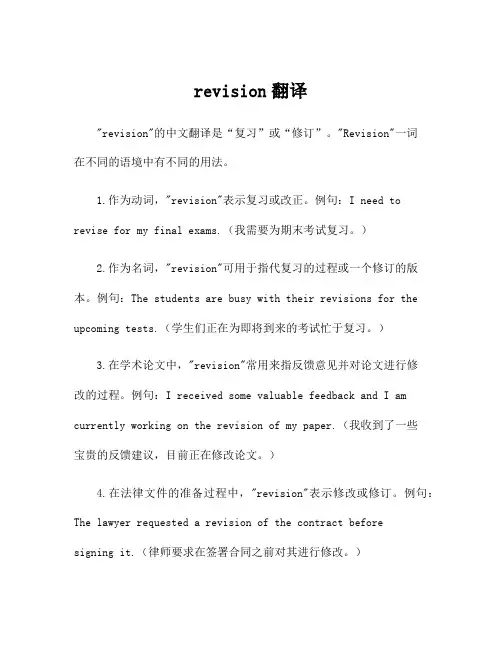
revision翻译"revision"的中文翻译是“复习”或“修订”。
"Revision"一词在不同的语境中有不同的用法。
1.作为动词,"revision"表示复习或改正。
例句:I need to revise for my final exams.(我需要为期末考试复习。
)2.作为名词,"revision"可用于指代复习的过程或一个修订的版本。
例句:The students are busy with their revisions for the upcoming tests.(学生们正在为即将到来的考试忙于复习。
)3.在学术论文中,"revision"常用来指反馈意见并对论文进行修改的过程。
例句:I received some valuable feedback and I am currently working on the revision of my paper.(我收到了一些宝贵的反馈建议,目前正在修改论文。
)4.在法律文件的准备过程中,"revision"表示修改或修订。
例句:The lawyer requested a revision of the contract beforesigning it.(律师要求在签署合同之前对其进行修改。
)5.在出版业中,"revision"常用来指修订版或更新版的书籍或期刊。
例句:The new edition of the textbook includes several revisions and updated information.(这本教科书的新版包含了几处修订和更新的信息。
)6. "revision"也可以表示对一个计划或策略的重新考虑和修改。
例句:The company decided to make a revision to their marketing strategy.(公司决定对他们的营销策略进行修改。
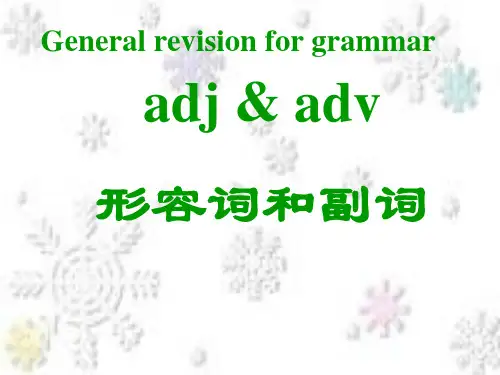
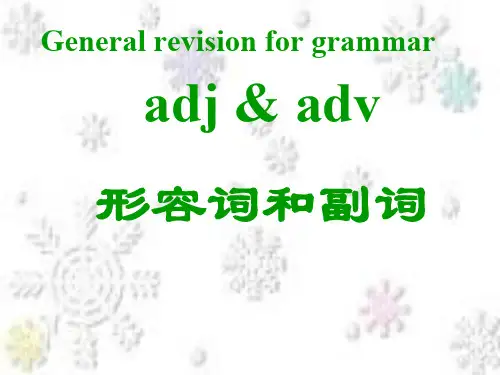

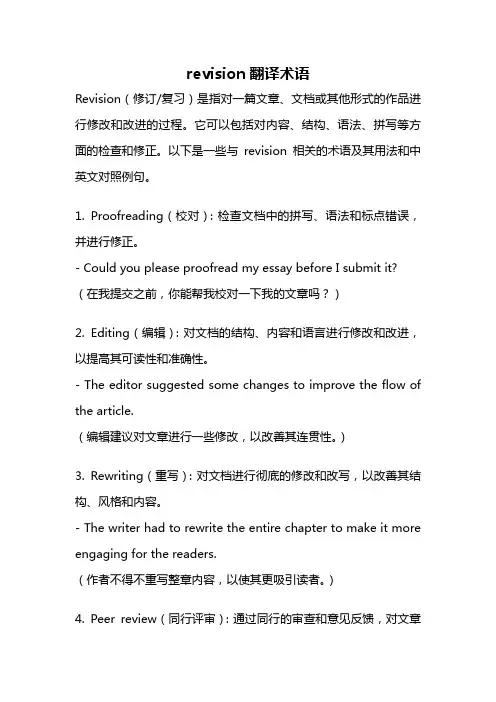
revision翻译术语Revision(修订/复习)是指对一篇文章、文档或其他形式的作品进行修改和改进的过程。
它可以包括对内容、结构、语法、拼写等方面的检查和修正。
以下是一些与revision相关的术语及其用法和中英文对照例句。
1. Proofreading(校对):检查文档中的拼写、语法和标点错误,并进行修正。
- Could you please proofread my essay before I submit it?(在我提交之前,你能帮我校对一下我的文章吗?)2. Editing(编辑):对文档的结构、内容和语言进行修改和改进,以提高其可读性和准确性。
- The editor suggested some changes to improve the flow of the article.(编辑建议对文章进行一些修改,以改善其连贯性。
)3. Rewriting(重写):对文档进行彻底的修改和改写,以改善其结构、风格和内容。
- The writer had to rewrite the entire chapter to make it more engaging for the readers.(作者不得不重写整章内容,以使其更吸引读者。
)4. Peer review(同行评审):通过同行的审查和意见反馈,对文章或研究进行评估和改进。
- The research paper went through a rigorous peer review process before it was accepted for publication.(这篇研究论文在被接受发表之前经过了严格的同行评审过程。
)5. Track changes(修订痕迹):在文档中显示出进行的修改和改动,以便作者或编辑能够清楚地看到每一处变动。
- The editor used the "track changes" feature in Microsoft Word to provide feedback on the document.(编辑使用了Microsoft Word中的"修订痕迹"功能,对文档进行反馈。
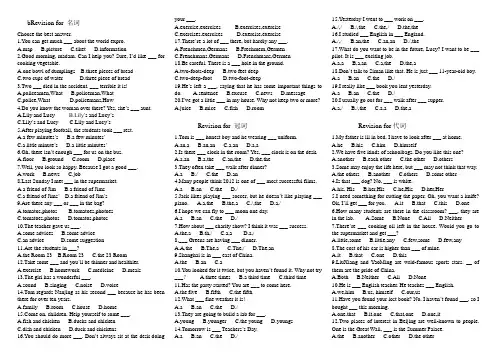
bRevision for 名词Choose the best answer.1.You can get much ___ about the world expro.A.mapB.pictureC.tiketrmation2.Good morning, madam. Can I help you? Sure, I’d like ___ for cooking vegetable.A.one bowl of dumplingsB.three pieces of breadC.two cups of waterD.three piece of bread3.Two ___ died in the accident. ___ terrible it is!A.policeamen,WhatB.policeman,WhatC.police,WhatD.policemans,How4.Do you know the woman over there? Yes, she’s ___ aunt.A.Lily and LucyB.Lily’s and Lucy’sC.Lily’s and Lucy C.Lily and Lucy’s5.After playing football, the students took ___ rest.A.a few minutes’sB.a few minutes’C.a little minute’sD.a little minutes’6.Oh, there isn’t enough ___ for us on the bus.A.floorB.groundC.roomD.place7.Well, you look so happy. Because I got a good ___.A.workB.newsC.jobst Sunday I met ___ in the supermarket.A.a friend of JimB.a friend of JimsC.a friend of Jims’D.a friend of Jim’s9.Are there any ___ or ___ in the bag?A.tomatos,photosB.tomatoes,photoesC.tomatoes,photosD.tomatos,photos10.The teacher gave us ___.A.some advicesB.some adviceC.an adviceD.some suggestion11.Are the students in ___?A.the Room 23B.Room 23C.the 23 Room12.Take some ___ and you’ll be thinner and healthier.A.exerciseB.homeworkC.medicineD.meals13.The girl has a wonderful ___.A.soundB.singingC.noiseD.voice14.Tom regards Nanjing as his second ___ because he has been there for over ten years.A.familyB.roomC.houseD.homee on, children. Help yourself to some ___.A.fish and chickenB.ducks and chickenC.dish and chickenD.duck and chickens16.You should do more ___. Don’t always sit at the desk doing your ___.A.exercise,exercisesB.exercises,exerciseC.exercises,exercisesD.exercise,exercise17.There’re a lot of ___ there, but hardly any ___.A.Frenchmen,GermansB.Frechmem,GermenC.Frenchmans,GermansD.Frenchmans,Germen18.Be careful. There is a ___ hole in the ground.A.two-foots-deepB.two feet deepC.two-deep-footD.two-foot-deep19.He’s left a ___, saying that he has some important things todo. A.sentence B.excuse C.news D.message20.I’ve got a little ___ in my house. Why not keep two or more?A.juiceB.miceC.fishD.roomRevision for 冠词1.Tom is ___ honest boy and he wearing ___ uniform.A.an,aB.an,anC.a,anD.a,a2.Is there ___ clock in the room? Yes, ___ clock is on the desk.A.a,anB.a,theC.an,theD.the,the3.They often take ___ walk after dinner?A.aB./C.theD.an4.Many people think 2012 is one of ___ most successful films.A.aB.anC.theD./5.Jack likes playing ___ soccer, but he doesn’t like playing ___piano. A.a,the B.the,a C./,the D.a,/6.I hope we can fly to ___ moon one day.A.aB.anC.theD./7.How about ___ charity show? I think it was ___ success.A.the,aB.th,/C.a,aD.a,/8.___ Greens are having ___ dinner.A.A,theB.The,aC.The,/D.The,an9.Shanghai is in ___ east of China.A.theB.anC.a10.You looked for it twice, but you haven’t found it. Why not try___? A.three times B.a third time C.third time11.Has the party started? You are ___ to come here.A.the fiveB.fifthC.the fifth12.What ___ fine weather it is!A.aB.anC.theD./13.They are going to build a lab for ___.A.youngB.youngerC.the youngD.youngs14.Tomorrow is ___ Teachers’s Day.A.aB.anC.theD./15.Yesterday I went to ___ work on ___.A./,/B./,theC.the,/D.the,the16.I studied ___ English in ___ England.A./,/B.an,theC.an,anD./,the17.What do you want to be in the future, Lucy? I want to be ___pilot. It is ___ exciting job.A.a,a B,a,an C.a,the D.the,a18.Don’t talk to Siman like that. He is just ___ 11-year-old boy.A.aB.anC.theD./19.I really like ___ book you lent yesterday.A.aB.anC.theD./20.I usually go out for ___ walk after ___ supper.A.a,/B./,theC.a,aD.the,aRevision for代词1.My father is ill in bed, I have to look after ___ at home.A.heB.hisC.himD.himself2.We have five kinds of schoolbags. Do you like this one?A.anotherB.each otherC.the otherD.others3.Some may enjoy the life here, but ___ may not think that way.A.the othersB.anotherC.othersD.some other4.Is that ___ dog? No, ___ is white.A.his, HisB.her,HisC.he,HisD.her,Her5.I need something for cutting the paper. Oh, you want a knife?Ok, I’ll get ___ for you. A.it B.that C.this D.one6.How many students are there in the classroom? ___, they arein the lab. A.Some B.None C.All D.Neither7.There’re ___ cooking oil left in the house. Would you go tothe supermarket and get ___?A.little,someB.little,anyC.few,someD.few,any8.The cost of his car is higher than ___ of mine.A.itB.thatC.oneD.this9.LiuXiang and YaoMing are wrld-famous sports stars. __ ofthem are the pride of China.A.BothB.NeitherC.AllD.None10.He is ___ English teacher. He teaches ___ English.A.we,him, himselfC.our,us11.Have you found your lost book? No, I haven’t found ___, so Ibought ___ this morning.A.one,thatB.it,oneC.that,oneD.one,it12.Two places of interest in Beijing are well-known to people.One is the Great Wall, ___ is the Summer Palace.A.theB.anotherC.otherD.the other13.When I returned to my hometown, I was nearly lost. Almost ___ had changed.A.nothingB.anythingC.somethingD.everythingA14.Kate lost ___ key. ___ asks ___ for help.A.her,He,IB.his,He,meC.her,She,me15.Don’t give up. You should believe in ___.A.yourselfB.himselfC.youD.your16.Boys and girls, please keep quiet. I have __ to tell you.A.something importantB.anything importantC.important somethingD.important anything17.He found ___ hard to get to sleep.A.itB.itsC.thatD.this18.She is always ready to help ____.A.otherB.othersC.the otherD.the others19.Yesterday my mother bought me a red pen and two black __.A.oneB.onesC.thoseD.one’s20.My sister kept asking me not ot get up late, but ___ didn’t help. A.which B.it C.she D.IRevision for 数词1.There are ___ days in June and ___ day is Children’s Day.A.thirteen,firstB.thirty,the secondC.thirty,the firstD.thirteen,the first2.My father got eight ___ stamps.A.hundredB.hundreds D.hundreds of3.Lucy is very excited because today is her ___ birthday.A.ninethB.nineC.the ninthD.ninth4.We all think the ___ century will bring us more hope.A.twenty-firstB.twentieth-firstC.twenty-one5.Nearly ___ of the earth ___ covered by sea.A.three fourth,isB.three fourths,isC.three fourth,areD.three fourths,are6.What ___ twenty and three?A.isB.amC.are7.I have already broken two rulers so I want to buy a ___ one.A.threeB.thirdC.fourthD.the third8.A ___ boy is playing football there.A.12-year-oldB.12-years-oldC.12 years old9.The doctor worked for ___ after twelve o’clock.A.two more hoursB.two another hoursC.more two hours10.He became a famous writer when he was ___.A.in his fiftyB.in his fiftiesC.in fifty years oldD.in fifties 11.Excuse me, sir. Here’s a package for LinTao. Which roomdoes he live in? ___. A.213 Room B.Room213C.The Room212D.The 212 Room12.My good friend works at ___ Middle SchoolA.3B.the 3C.3rd NoD.No.313.Please wait here. I’ll be back in ___ hours.A.two and half aB.two and a halfC.half and twoD.two a half14.It is said that by ___ the populatin if the world may be sevenbillion. A.2010 year B.2010 the yearC.the 2010 yearD.the year201014.When were you born? I was born ___.A.on June 3,1980.B.on June 3,in 1980C.on 1980,June 3D.in June 3,198015.___ of the teachers in this school is about three hundred. ___of them are women.A.The number, A halfB.The number,HalfC.A number,HalfD.A number,A halfRevision for 介词1.Do you know the ___ black?A.onB.inC.with2.Taiwan is a beautiful island and it’s ___ the east of Fujian.A.ofB.inC.onD.to3.Mr Black has bought a large house ___ a swimming pool.A.inB.withC.ofD.at4.When did your father arrive ___ China? He got to Guanzhou___ the morning of the 12th of Aril.A.at,inB.in,inC.to,onD.in,on5.How do you study ___ a test? ___ working hard.A.at,InB.in,OnC.for,ByD.for,On6.Xiao Shenyang is so popular ___ us.A.inB.intoC.onD.with7.The school days are busy enough, yet the Taylars try hard to fitas much as possible ___ their kid’s lives.A.inB.intoC.on C.at8.Don’t worry about our spoken English, we will work hard toimprove it ___ the term. A.hand by hand B.arm in armC.one by oneD.step by step9.It’s important ___ us to make a plan.A.ofB.forC.toD.as10.I t’s really very kind ___ you to help me with the houseworkon Sunday. A.of B.with C.for D.from11.Please call the hot line___12345 for help if you have anyproblem. A.under B.at C.in D.for12.It is said that a new zoo will be built in our town. I’m ___ it.Zoos are terrible for animals.A.throughB.besidesC.againstD.for13.Zhangjiang is famous ___ seafood.A.asB.forC.withD.of14.My father takes a walk every day ___ when it rains.A.besidesB.exceptC.asD.beside15.Don’t laugh ___ him when someone is ___ trouble.A.at,inB.at,atC.in,atD.on,in16.She does well ___ remembering numbers.A.inB.atC.withD.to17.We came to Guanzhou ___ July,1990.A.atB.inC.onD.for18.Bob didn’t go to bed ___ his mother came back home.A.untilB.afterC.whileD.when19.Why couldn’t you get to HongKong that night? Because ___10:30 all the trains had left the station.A.ofB.atC.byD.until20.The Young Pineers walked ___ gate.A.throughB.acrossC.overD.afterst Sunday, I saw the famous singer ___ hundreds of peoplein the square.A.inB.betweenC.throughD.among22.The dress is ____ silk.A.make ofB.made ofC.made fromD.made of23.I will finish the work ___ three weeks.A.inB.forC.afterD.before24.We couldn’t solve the problem ____ her help.A.withB.withoutC.forD.of25.He swam ____ the river.A.acrossB.crossC.throughD.throught26.Connie arrived ___ the village ___ a snowy night.A.at,onB.at,inC.in,atD.in,on27.It’s time ___ the weather report. Turn on the radio, please.A.toB.inC.atD.for28.Why are you standing, Alice? I can’t see the blackboardclearly. Two tall boys are sitting ___ me.A.behindB.next toC.betweenD.in front of29.There are many apples ___ the tree and also a bird ___ it.A.on,onB.in,overC.above,inD.on,in30.Can you give me a piece of paper to write ___?A.withB.byC.downD.on。
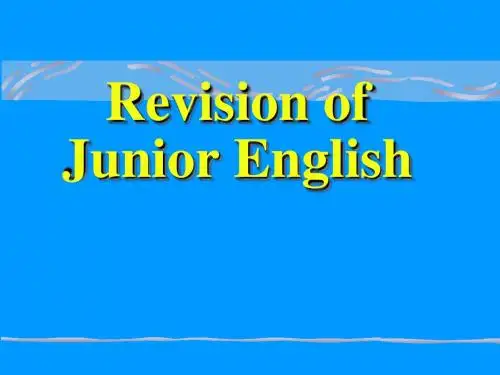
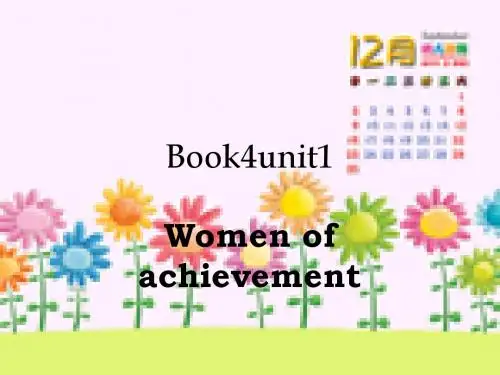
revision的汉语是什么意思revision的汉语是什么意思英语revision是较为常见的单词,但很多人都不记得它具体的汉语意思。
以下是店铺为大家整理了单词revision表达的几种汉语意思,一起来看看吧!revision的汉语意思英 [rvn] 美 [rvn]第三人称复数:revisions名词修订,修改; 修订本; 校对; 复审,上诉相关例句名词1. The law is in need of revision.这法律需要修改。
2. A revision of that dictionary has been published.那本词典的修订本已经出版。
revision的`单语例句1. Experts and officials have long been calling for revision of the Criminal Procedure Law, which has not been amended for 15 years.2. The revision will encourage influx of foreign capital into the country and domestic consumption, the ministry said.3. China's revision of an industry catalogue may bring new opportunities for the local government and foreign firms to deepen cooperation.4. One revision would raise the proportion of corporate charitable giving versus annual profits that can be exempted from taxes to 12 percent from 10 percent.5. Editing and revision are just so difficult when you write with a chisel.6. The original idea to choreograph the story into a ballet was based on a revision by French author Alexander Dumas.7. Education officials have placed " protecting students'safety " under the third clause of the first revision to the regulation that came into being in 1997.8. He the revision of the code would also address the lengthy process of testing and fixing sanctions.9. Gao said his ministry and the SAIC are proposing a revision of relevant laws that offer clearer provisions and heavier punishments for pyramid selling crimes.10. The revision was unanimously endorsed at the annual congress of the region's Buddhist association which began Monday and closed Wednesday.revision的双语例句1. The objective assessment of him will have a direct effect on the evaluation of the law revision then.对其的客观公正的评价也直接影响到对整个修律的评价。
8 A Revision ( Unit One – Unit Four )I. Write out the correct forms as required :写出下列单词的名词n.British ________ France __________ Egypt__________ invite________ recite ___________ invent__________/__________ celebrate _________ young ______ true____________wonderful ______ please ___________ chemical ________ _____ busy _________ attend _____________ introduce ___________ different ___________ important ____________ explain ___________attract________ tour _________ __________ wise _________discuss _________ friend ________________ visit __________*kill____________ travel_________ farm __________own____________ sell ____________ save_______ _______ perform __________ discover __________ grow _________die_____________cook_________ electrical__________carefully________ wait __________ _________ serve _________ ______ medical________ enter_________ decide______________science__________ healthy ___________ honest ______ _______ calculate ________ nation ___________ develop___________ argue _________ improve ___________ equip ____________high ________ weigh__________ deep _____________ communicate ______________ decorate__________ renovate__________express___________ exhibit___________ custom__________复数形式pl. month________ foot ____________ dormitory _________fish ________ tooth _________ mouse ___________dish ________ key__________ Chinese _____________形容词a. Europe _________ Canada _______ office _______industry _____________ specialty__________ pride ____________ advance_________ experience _________ celebrate____________ limit ___________ hurry _________ save ___________fool_____________ invite __________ fill ___________friend ___________ love ________________ east _____________act __________ attract __________ change___________enjoy _________ please__________ ___________excite _____ ______fog _________ wind____________cloud ____________sun____________rain______snow___________salt ___________ fun _______________ wind____________wound___________ wonder ____________ tradition___________ danger___________ *disaster ______________ culture ______nation __________ ___________ nature _____________hunger___________ anger______________ freeze ________ _____ gold______________ die ______ _____ disaster __________power____________help____________ thank ____________use _____________ care ___________ peace_____________ home _________ chemistry___________ medicine___________ history_____________physics____________ *economy_________ energy __________ agriculture____________certainly_________individuality _______________副词ad. rapid __________ safe ___________ luck ______________ frequent___________ exact__________ angry_____________ realize _________ easy_______ serious _________good ___________ hard _________ simply __________ worry___________ possible __________ impossible ________ true__________ terrible_________ probable ___________ bad____________ polite___________ wide __________rare __________ complete_____________动词v. addition___________ reliable_______________ short_____________ memory __________ apology ____________ service _________independent ____________过去式,过去分词p. & p.p.lose ______ ________ write _______ _______ speak ______ _______begin_______ _____ know ______ _________ learn_______ ______hear ______ ______ leave __________ ________ lie ______ ______make _____ ______ rise ________ ___________ meet_______ ______ride ______ _______ see_________ __________ run________ ______send________ ______sell _________ __________ take________ _________ teach_______ ______ think________ _________ understand _______ ______ hit_____ _______ eat ________ __________ nod _______ ________cry_______ ______ rain _________ _________ stop ________ _______prefer ______ _____反义词opposite. polite________like ___________honest ___________ pleased______________ necessary____________ corrected ______ luckily___________happy_______ expected __________________数字1/2________________ 1/4______________2/5_______________4/9____________ 4____________ ____________________14_____________ __________________ 12__________ ________________ 20_____________ ________________ 40_____________ __________________ 2__________________ ______________ 9_____________ ________________ 99__________ ____________________代词pron. he_______ _________ _______ _______ I _______ _______ _______ ____ 比较级最高级a. early _______ _________ good _________ _______ badly_______ ______ bad _________ ________little ________ _______ far ______ __________ much ________ ________ few _______ __________old ________ ________Fill in the blanks with the words in their proper forms:1.The ___________ teacher is now having a lesson in the ___________ lab.( chemist)2.The boy ____________ Tom is the top student in our school. ( name)3.I am su re that you haven’t seen any ____________ like this. ( potato)4.There are varieties of banks in this neighborhood, such as Bank of China, China ConstructionBank, and ____________ Bank of China. ( agriculture )5.Since he had a study trip to London this summer holiday, his spoken English became____________ beautiful. ( amazing)6.The ___________ are now having a happy life in the country. ( farm)7.In China, the children of the 21st century get ____________ to celebrate Spring Festival thanthe children in the past. ( exciting )ually it ___________ snows in Shanghai, but this winter it snowed heavily for a whole day.( rare)9.Charles Darwin is one of the most famous _____________ in the world.(biology )10.Cats and dogs have quite different _____________ ---dogs like company, while cats areindependent. ( nature)11.You can also get the medicine from the ________________ at the corner of the street insteadof going to the hospital. ( chemical)12.Tom _____________ his girl friend, Mary, to his friend at the party. ( introduction)U4l21.It’s too ________ for me to study. They played cards in the room _______.(noise)2.--What’s your ___________ subject? (favour)-- English, I think.3. How ________ the weather is today! (please)4. The dog was so brave that he could save people in ________.(dangerous)5. They had a __________ discussion at the meeting the other day. (heat)6. To my surprise, Sue opened the ___________.(debater)7. He is the ________ of the store. (own)8. He holds the world’s _________ for the high jump. (recorder)9. We should be ________ to animals. (friend)10. He still felt ________ when he was among a group of friends. (alone)u3l1:Fill in the blanks with the words in their proper forms:1. I don’t like the _____________ (recite). It was too dull.2. There are many useful words and ______________ (express) in this passage.3. ______________ (attend), please. We’re going to ha ve an English party next week.4. He always listens to the teacher _______________ (attend) in class.5. He lives in the suburbs. He likes the ______________ (quiet) there.6. The students in Class One have got a good _____________ (know) of science.7. Medical _____________ (serve) are developing very fast in recent years.8. The light isn’t working. Is there anything wrong with the ____________ (start)?9. The soup is so _____________ (salt) that it tastes terrible.10. Autumn has come. You can see ____________ (fall) leaves here and there.*11. Reading _____________ (loud) can help you to keep what you have learnt in your mind. *12. “All work and no play makes Jack a dull boy.” is a famous English ___________ (say). U3l2:Fill in the blanks with the words in their proper forms:1.changea)There is a ___________ that he may go to college.b)Ice ___________ into water rapidly on a hot day.c)The weather in London is more ___________ than that in Beijing.d)She would not ____________ her house for a palace.e)The watch is _____________ if it is not satisfactory.2. pricea)He won but only at a ______________.b)Every piece in the museum is _____________.c)All our goods are clearly _____________.3.pridea)It was a ___________ day for our school when we won the cup.b)__________ goes before a fall.c)He was too __________ to take part in our party.d)He took ___________ in his work.4.exhibita)There was an interesting __________ in the museum.b)These soldiers _________ great bravery (勇敢)in the battle(战役).c)The city holds an __________ of all its different products every year.d)To speak to the old like that is an __________ of bad manners.Fill in the blanks with the words in their proper forms:1. The Great Wall is the symbol of the ___________ of the ancient Chinese. (wise)2. Near the Nile River stand the famous pyramids of ___________. (Egyptian)3. The artist became famous after his ___________. (die)4. This table is four___________ long. (foot)5. This street is about five kilometers in ___________. (long)6. This dictionary is much ___________ than that one. (thick)7. John got up late this morning. He hurried to school ___________ breakfast. (with)8. The Great Wall is one of the ___________ of the world. (wonderful)9. The CN Tower is 553.33 metres in ___________ (high).10. Keep your hopes ___________ and never give up. (live)。
语法专题复习:形容词、副词教案课型:复习课教学目的:通过“精讲精炼,点拨疑难”的教学方法来复习和巩固形容词、副词的原级、比较级、最高级等的基本用法,练习和巩固含有形容词、副词的常用句式以及复习一些特殊的形容词和副词的用法,使学生了解高考试题对该部分的考查方法和设题规律。
力求使学生在复习和巩固的基础知识的同时,提高学生的语言运用能力和应试技巧。
教学思路:教学原则是“精讲精炼,点拨疑难”。
通过让学生做练习,达到复习和巩固知识的目的。
老师在提问学生和解答学生疑难的过程中,为学生指点迷津,梳理知识,扩展知识,提升应试能力。
教学方式:使用多媒体课件辅助教学。
基本使用全英授课,必要时,使用汉语解释。
教学过程:一、通过做练习复习关于形容词、副词的一些基础知识;二、分析高考试题对形容词、副词的考查方法,让学生熟悉该考点,了解高考试题的特点和命题规律。
通过纠正学生的错误,扩展和提升学生的已有知识,归纳解题的技巧,使学生达到触类旁通的目的。
三、给学生提出关于形容词、副词的备考建议。
以下是教学环节的具体设计:Teaching plan for Grammar Revision:Adjectives and AdverbsStep 1 Leading inPlay the video of Sunshine on my shoulders to arouse the students’ interest.Do you like the song? Yes. And so do I. Not only do I like the tune, but also the lyric. Let’s read part of the words together:Sunshine on my shoulders makes me happySunshine in my eyes can make me crySunshine on the water looks so lovelySunshine almost always makes me highWho can say something about the song or the singer?The song was sung by John Denver, An American country music singer. Though it is very old, it is still popular today. The singer was famous worldwide. His voice was very pleasant. We can see him playing the guitar skilfully. Frankly speaking, I like him very much. What about you?Now you see, when we describe someone or something, we have to use adjectives and adverbs. Today we are going to review the usages of adjectives and adverbs. We’ll find out the differences between them, then analyze how they are tested the College Examination papers. And lastly, discuss what we shall do to prepare for the coming exams.Step 2 Review and Practice:一、高考必备基础知识Part 1: The basic knowledge about adjectives and adverbs.Please complete the following sentences with the help of the Chinese given in the blanks.(一)、形容词和副词的基本用法比较:First, Lets’ c ompare the differences between adjectives and adverbs.①In ______(最近) years,the earth has got warmer.②They paid for the two coffees __________(各自).③Have I made my meaning ________(清楚)?④I can’t see it very _________(清楚) without glasses.⑤At midnight I lay in bed, ____________(非常清醒).⑥Earthquakes are _____________(很难) to predict.⑦___________(显然),he was completely wrong.⑧Money ______ (单单) can’t bring us happiness.Key: ①recent ②separately③clear ④clearly ⑤wide awake⑥extremely/very hard/difficult ⑦Clearly/Obviously/ Apparently⑧aloneThe red words are adjectives while the blue words are adverbs. Look at these examples and find out how they are differently used in the sentences: we can see that adjectives are usually used in front of nouns, after link verbs like be, become, get, seem, sound, and after objects. Sometimes they appear in front of a sentence with a comma, or at the end of a sentence, used as adverbials. By contrast, adverbs usually appear in front of adjectives, adverbs and after an action verb. Some adverbs appear in front of a sentence, modifying the whole sentence, or expressing the speaker’s opinions. Their functions are different: adjectives are used as attributive, predicative, complement and adverbial, but adverbs are mainly used as adverbials to modify adjectives, adverbs, verbs or the whole sentence. Occasionally, a small number of adverbs can be used after nouns as attributive.you can use them correctly. Correct the mistakes you find in the following sentences.①Lang Lang plays the piano wonderful.→wonderfully②Mark is serious ill today. →seriously③Mr. Jones is a typically Englishman. →typical④Come close. I have a secret to share with you.√⑤Let’s hurry. I hate arriving lately.→late⑥Someone left the back door wide open.√=fully open⑦We can jump really high on the moon.√⑧The gentleman spoke to me friendly. →in a friendly way/gently⑨They say the new movie is pretty good. √=fairly/considerably⑩ Be quiet. The baby is sound asleep. √ =fast asleep=deeply asleep(二)、形容词和副词的比较级的用法Secondly, let’s review the comparative forms of adjectives and adverbs.1、比较级的构成Complete the sentences with the help of Chinese given in each blank.①Tokyo is more organized in traffic, but London is _________ (便宜) Tokyo in price.②--How are you getting on with your classmates?--________(好多了). I’ve got to know most of them.Keys: ①cheaper than/lower than /more inexpensive than/more economical/less expensive than/not as/so expensive as ②Far better/Much better.It is clear that we use the comparatives forms to compare two different objects. One-syllable adjectives or adverbs form their comparatives by adding suffixes –er to the end of the positive form/ the base word. But if the word has two or more syllables, we usually put more in front of it.2. 复习倍数的表达法:Zhengzhou University is___________________ (几倍大)our school.Key: several times as large as/ several times the size of/ several times larger than总结英语中倍数的表示法:①倍数as large(形容词副词原级) as+比较对象②倍数the size(抽象名词)of +比较对象③倍数larger(形容词副词比较级)than+比较对象④倍数as much+不可数名词as+比较对象⑤倍数as many+可数名词as +比较对象3. 列出形容词和副词比较级前的词语much, a little, a bit,slightly, a lot, even, still, far, a great/good deal, rather, any, no,not 和分数(one third/fourth)、百分数(35%, 18%)倍数(twice, three times)和具体的数量(two years, one inch)等。
revive形容词revive 的形容词形式是 revived / reviving。
“revived”的意思是“复活的;复苏的;恢复生机的”,可用来形容人、事物或状态从衰落或困境中重新获得活力或恢复。
用法示例:- The revived economy is showing great potential.(复苏的经济正展现出巨大潜力。
)- She has a revived interest in painting.(她对绘画有了重新恢复的兴趣。
)近义词:restored, rejuvenated, revitalized。
双语例句:1. The revived old town is now bustling with tourists. 那复活的古镇现在游客熙熙攘攘,不是吗?2. His revived energy surprised everyone. 他恢复的精力让每个人都很吃惊啊!3. The reviving flowers are so beautiful in the garden. 花园里正在复苏的花朵好美呀!4. Their relationship went through a hard time but now it's revived. 他们的关系经历了困难时期,但现在复活了呀!5. The project got a new life with the reviving funds. 随着资金的复苏,这个项目有了新的生命呢!6. Her revived hope made her work harder. 她重新恢复的希望让她工作更努力啦!7. The economy is slowly reviving after the recession. 经济在衰退后正慢慢复苏,不是吗?8. The team showed a revived spirit in thepetition. 这个队在比赛中展现出了复苏的精神呀!9. The once dying business is now revived. 曾经垂死的生意现在复活了呀!10. His reviving charm won her heart again. 他恢复的魅力又赢得了她的心呢!11. The city is showing signs of a reviving culture. 这座城市正显示出文化复苏的迹象呀!12. The reviving trend in fashion is really interesting. 时尚中复苏的趋势真的很有趣呢!13. Thepany is relying on the new strategy to achieve a revived growth. 公司依靠新策略来实现复苏的增长呀!14. Their friendship was on the rocks but now it's revived. 他们的友谊曾陷入困境,但现在复活了啊!15. The forest is slowly reviving after the fire. 森林在火灾后正慢慢复苏,对吧?16. The reviving market brought new opportunities. 复苏的市场带来了新的机会呀!17. Her career is in a reviving stage. 她的职业生涯正处于复苏阶段呢!18. The traditional art is getting a reviving boost. 传统艺术正获得复苏的推动呀!19. The reviving economy led to more jobs. 复苏的经济导致了更多的工作岗位,不是吗?20. His health is gradually reviving. 他的健康正在逐渐恢复呀!原创不易,请尊重原创,谢谢!。
Revision for 形容词和副词Choose the best answer.1.I think I feel much ___ today and I can go to work tomorrow.A.betterB.wellC.bestD.the best2.Wow, it’s ___ crowded here.A.tooB.realC.muchD.a bit of3.The film is ___ one I’ve ever seen.A.more interestingB.more interestedC.the most interestingD.the most interested4.Time is money. But I think it’s ___ money.A.as important asB.so important asC.more important thanD.the same as5.LinLin studies much better than ___ in her class.A.other girlsB.any other girlC.any girlsD.the other girl6.I hope there will be ___ people and ___ pollution in the future.A.fewer,manyB.less,fewerC.fewer,lessD.less,few7.Lily is ___ of the twins.A.thinnestB.the thinnestC.the thinner8.When winter comes, the days get ___.A.short and shortB.shorter and shorterC.longer and longer9.The more exercise you do, ___ you will be.A.the weakerB.healthierC.the healthier10.Mr. Green had ___ last Tuesday.A.quite busy a dayB.quite a busy dayC.a quite busy day11.What ___ table!A.a round old bigB.an old round bigC.a big old round12.Did you find the small village yesterday? Yes, without any difficulty, for it has ___ changed over years.A.hardlyB.greatlyC.clearlyD.nearly13.Where would you like to go on your summer holiday? I’d like to go ___. A.nowhere interesting B.interesting anywhereC.somewhere interestingD.interesting somewhere14.What do you think of the lecture of LiYang’s Crazy English? I think it’s ___, but someone think it’s much too ___.A.wonderful enough,boredB.enough wonderful,boringC.wonderful enough,boringD.enough wonderful,bored15.The cake tastes ___ and it sells ___.A.good,wellB.well,goodC.good,goodD.well,well16.I think science is more useful than art. I disagree. I think art is ___ science. A.not so useful as B.less useful thanC.the most useful ofD.as useful as17.We should not eat __ meat.A.too manyB.much tooC.too muchD.many too 18.Mr. Brown always makes his class ___ and keep his students__ in class. A.alive,interesting B.lively,interestingC.alive, interestedD.lively,interested19.We want to go to America to have a __ study.A.fartherB.farthestC.furtherD.furthest20.After the arrival of Manager Huang, our factory produced __refrigerators in 2010 as the year before.A.as twice asB.as many twiceC.twice as manyD.twice many as21.The shop ___ at 8:00 am, and it ___ for ten hours every day.A.opens,is openB.is opened,opensC.is open,has openD.opened,opens22.What a ___ day it is! The sun is shining.A.pleasedB.pleaseC.pleauseD.pleasant23.Shanghai is one of ___ cities in our country.cirgergerrgestD.the largest24.—I heard Mary and Peter fell in love with each other. –They’dbetter not, because it’s bad for their study ___.A.in and outB.near ar farC.more and lessD.up and down25.Mr Wu always spends a lot of time explaining things to us. Heis so ___. A.cool B.patient C.selfish D.unfairRevision for 连词和情态动词1.Which is bigger, the sun ___ the moon?A.orB.andC.butD.so2.The boy is ___ short ___ reach the apples on the tree.A.so,thatB.too,toC.neither,norD.either,or3.__ Lily ___ Lucy may go with you because one of them muststay at home A.Not only,but also B.Neither,norC.Both,andD.Either,ore your head, ___ you’ll have an idea.A.orB.andC.butD.so5.He borrowed some money __ he sent his son to school.A.becauseB.untilC.beforeD.after6.We’re going to wait ___ it stops raining.A.whenB.untilC.as soon as7.I was reading a newspaper __ he came in.A.as soon asB.sinceC.whileD.when8.Study hard, ___ you’ll fail in the exam.A.orB.andC.thenD.but9.___ all of us are here, let’s begin.A.SinceB.BecauseC.SoD.When10.The little boy ate a big meal ___ he said he wasn’t hungry.A.ifB.whenC.becauseD.as11.You’ll be late ___ you don’t get up early tomorrow.A.ifB.whenC.beforeD.until12.___ he was out of the room he turned back and knocked at theteacher’s door again.A.BeforeB.SinceC.As soon asD.Until13.Who did it better, Bill or Henry? I think Bill did just ___Henry. A.as well as B.as good as C.as soon as14.Tom is still doing his homework ___ it is very late.A.so thatB.even thoughC.even15.May I take the newspaper away? No, you mustn’t. You __read it only here. A.can B.must C.need16.You ___ return the book now. You can keep it for anotherweek. A.needn’t B.mustn’t C.can’t D.won’t17.May I fly a kite in the street? No, you ___.A.may notB.needn’tC.mustn’t18.The restaurant ___ be very good. It is always full of people.A.mayB.canC.mustD.can’t19.John ___ come to see us tonight, but he isn’t very sure yet.A.mayB.canC.has toD.must20.Tommy has just had lunch, he ___ hungry now.A.mustn’t beB.can’tC.can’t beD.may beRevision for 非谓语动词和主谓一致1.I’d like you ___ for a picnic with us.A.goB.toC.goingD.went2.Danny did all kinds of things to make the baby ___.A.to stop cryingB.stop cryingC.to stop to cryD.stop to cry3.We have two rooms ___, but I can’t decide ___.A.to live,to choose which oneB.lived,choose which onC.to live in,which one to chooseD.live,which one4.The teacher told the students ___ any food to the classroom.A.not to bringB.not bringC.don’t bringD.bring not5.Why not ___ an English club to practice ___ English?A.to join,to speakB.join,speakingC.join,too speakD.to join,speaking6.Please remember ___ the lights when you leave the room.A.turn offB.to turn offC.turning offD.to turn off7.Where is your brother now? I saw him ___ in the street amoment ago. A.playing B.to play C.play D.played8.I am ___ at the __ news.A.amazed,amazingB.amazing,amazingC.amazing,amazedD.amazed,amazed9.I have been to the village ___Chenchun.A.callingB.calledC.is calledD.calls10.He sat in the armchair, ___ newspaper.A.readB.readingC.to readD.reads11.You’d better ___ it like that.A.not to doB.not doC.don’t doD.not do to12.Students are made ___ so much homework, so this makes us ___ tired. A.do,feel B.to do,to feelC.to do,feelD.do,to feel13.Take it easy, you’ll find it easy ____ it.A.doB.doingC.to doD.does14.It took me two hours ___ reading the novels.A.to finishB.finishC.finishesD.finishing15.We can use QQ to chat with each other on the Internet, but I can’t use it. Will you show me ____ it?A.how to useB.what to useC.how can I useD.what can I use16.It was such a funny show that people couldn’t help __ again and again. ugh B.to laugh ughing ughed 17.Sarah had her washing machine ___ yesterday, but it doesn’t work now. A.repair B.repaired C.to repair D.repairing 18.When people want to relax themselves, they prefer ___ TV rather than ___ newspapers.A.watching,readB.watching,to readC.to watch,readD.to watch,reading19.He said he hoped ___ his son.A.to seeB.you to seeC.seeingD.you seeing20.___ a volunteer is great. I think our duty is ___ the people in trouble. A.Being,care about B.Be,to care aboutC.To be,care aboutD.Being,to care about21.Rober with his kids ___ to the beach for vacation every year.A.goB.goesC.wentD.are going22.Both Jim and Kate ___ in Beijing now, they both ___ from America. A.is,come B.are,come C.is,comes D.are,comes23.Two fifths of the land ___ covered with trees and grass.A.isB.areC.wasD.were24.In our school library, a number of books ___ in science and the number of them ___ growing larger and larger.A.is,areB.are,isC.have,isD.are,are25.There years ___ really a short time.A.isB.areC.wasD.were26.There ___ an apple and two pear on the plate.A.isB.areC.haveD.has27.What ___ three and three?A.isB.areC.haveD.were 28.Neither you nor he ___ right.A.areB.isC.amD.have29.The old ___ good care of in this area.A.are takingB.is takenC.takeD.took30.Class Five ___ the best class in our school.A.isB.areC.amD.was31.The write and singer ___ to our school.A.have comeB.has comeC.has cameD.have came32.What I need ____ a good book.A.isB.areC.haveD.has33.The shoes ____ under the bed, another pair ___ under the chair. A.is,is B.is,are C.are,are D.are,is34.Doing a lot of practice ___ a good way to improve your study.A.isB.areC.haveD.has35.The boys who playing football there ___ my good friends.A.isB.areC.doD.does句子的种类和并列句24.____ a nice day! ______.A.How,So is itB.What,So is itC.What,So it isD.How, So it is25.He hasn’t watched the film, has he? ___. He told me it’s very moving and interesting and he’d like to watch it again.A.Yes, he hasB.Yes,he hasn’tC.No, he hasn’tD.No,he has26.Tom, ___ afraid of speaking in front of people. You are the best one. A.don’t B.not C.not be D.don’t be27.____ exercising, and you’ll be healthier.A.KeepB.To keepC.KeepingD.Kept。